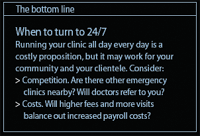Can your practice pull an all-nighter?
Practice owners must consider a variety of factors before offering 24-hour care.
Q: I own a busy three-doctor general practice and want to offer after-hours emergency service. How do I figure out whether it's a good move?
Considering the dynamic growth in emergency and specialty veterinary care and the benefits of round-the-clock care to clients and patients, it's no wonder you and many other veterinarians want to expand your hours and services in this way. Before making the leap, however, carefully consider the pros and the cons of operating a 24-hour practice.

Dr. Jim Clark, MBA
First let's talk about the financial aspects. In considering the additional cost to operate an after-hours emergency service, you've probably realized that you're already paying some of this overhead. Your building and all that equipment are sitting there every night, weekend, and holiday, whether you use them or not. Thus you have an opportunity to expand hours of use without increasing these fixed costs.
But while fixed costs won't change, don't forget about your increased labor costs. Savings in fixed overhead are small compared with the associated increases in staff salaries, benefits, and payroll taxes. In analyzing the impact that adding an emergency service would have on your cash flow, you need to pay most attention to the additional labor costs you'll assume.
Let's say you're currently open Monday through Saturday from 8 a.m. to 6 p.m. That's 60 hours per week. If you expand to provide 24-hour care, you'll add 108 hours of operation. You'll need to staff all of those hours with doctors and team members willing to work nights, weekends, and holidays. Your new team members will need to be highly skilled to provide care for sometimes critical emergency patients. Recruiting and retaining the necessary staff in our current veterinary labor market could be a major challenge.

The bottom line
Veterinarians and veterinary team members typically don't want to work weekends and overnight shifts, so you should anticipate needing to pay higher doctor and staff salaries for after-hours work. Also keep in mind that when you commit to staffing 24 hours a day, your payroll becomes a fairly fixed cost. In other words, whether you see one case a night or 20, you'll have to pay a doctor and typically two or more team members to be on duty.
With all that in mind, you can see that operating an after-hours emergency practice in the black requires significant gross revenue to cover the inherent labor costs. My experience suggests that you'll need annual gross revenue for the emergency service of at least $500,000 or $600,000 to break even. This number will be higher in some areas of the country and lower in others. It also doesn't include additional time for managers to establish and oversee the new service.

Theory into practice: 8 questions to ask before you commit to emergency hours
There are big benefits, though, to adding emergency hours. Both gross revenue and the number of new clients will increase dramatically, and the risk of an after-hours "mishap" because of inadequate patient monitoring will be reduced. In a community without an emergency facility, your clinic could become a valuable resource to clients and fellow veterinarians.
Q: So how can I make sure adding 24-hour service will be a profitable venture?
Here's a simple formula you can start with to figure profitability:
Average client transaction fee (ACT) x Number of transactions = Gross revenue
Considering the costs of 24/7 operation, your ACT for emergency services will need to be at least twice as high as the ACT at surrounding small animal general practices. This is a function not just of higher overhead but also the different nature and complexity of cases seen. As you might imagine, operating a 24-hour practice with two different fee schedules poses some challenges in and of itself. Some practices handle this by designating specific hours when emergency fees apply, or only adjusting certain prices.
You'll also want to avoid stepping on the toes of other veterinarians in the area. These doctors may be concerned about losing their clients to a general practice providing 24/7 care. In my experience, most general practitioners prefer supporting a true referral-only facility when given the option. No matter what you say or do, this will always be a concern among your colleagues, whether voiced or not. I see a general trend in the United States moving away from combined general-emergency practice to dedicated referral facilities. But in a community too small to support a dedicated 24-hour facility, a clinic with after-hours care can provide much-needed round-the-clock medicine for patients as well as relief for practitioners who no longer feel obligated to be on call at all hours.

In the trenches
Keep in mind, too, that expanded hours and increased gross revenue don't always translate to greater practice value. All valid valuation formulas are based on net income rather than gross revenue. Make sure your revenue trumps your expenses.
In the past 10 to 15 years, emergency practice has become much more clearly defined as a specialized discipline requiring particular skills and advanced equipment. A willingness to invest in this equipment and a well-trained staff is essential. Your patients and clients can benefit tremendously from access to 24-hour care by skilled veterinarians and team members with access to modern equipment. It's up to you to decide whether your clinic can provide this level of care effectively and profitably.
Dr. Jim Clark, MBA, owns multiple practices, including after-hours clinics, and is a consultant in the San Francisco Bay area. E-mail comments or questions to ve@advanstar.com, or post your thoughts on our message boards at dvm360.com.